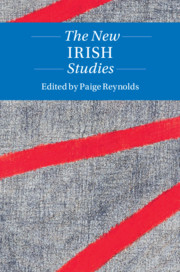Book contents
- The New Irish Studies
- Twenty-First-Century Critical Revisions
- The New Irish Studies
- Copyright page
- Contents
- Notes on Contributors
- Acknowledgments
- Introduction
- Part One Legacies
- Part Two Contemporary Conditions
- Chapter 6 The Global Contemporary: The Humanitarian Legacy in Irish Fiction
- Chapter 7 The Queer Contemporary: Time and Temporality in Queer Writing
- Chapter 8 The Feminist Contemporary: The Contradictions of Critique
- Chapter 9 The Maternal Contemporary: Pregnancy, Maternity, and Non-Maternity on the Irish Stage
- Chapter 10 The Aging Contemporary: Aging Families and Generational Connections in Irish Writing
- Part Three Forms and Practices
- Index
Chapter 10 - The Aging Contemporary: Aging Families and Generational Connections in Irish Writing
from Part Two - Contemporary Conditions
Published online by Cambridge University Press: 18 September 2020
- The New Irish Studies
- Twenty-First-Century Critical Revisions
- The New Irish Studies
- Copyright page
- Contents
- Notes on Contributors
- Acknowledgments
- Introduction
- Part One Legacies
- Part Two Contemporary Conditions
- Chapter 6 The Global Contemporary: The Humanitarian Legacy in Irish Fiction
- Chapter 7 The Queer Contemporary: Time and Temporality in Queer Writing
- Chapter 8 The Feminist Contemporary: The Contradictions of Critique
- Chapter 9 The Maternal Contemporary: Pregnancy, Maternity, and Non-Maternity on the Irish Stage
- Chapter 10 The Aging Contemporary: Aging Families and Generational Connections in Irish Writing
- Part Three Forms and Practices
- Index
Summary
In a youth-driven society such as Ireland, older adults may well find themselves marginalized by institutionalized ageism and figured as outsiders in the cultural imagination. Rather than static concepts of age, however, new patterns are emerging in post–Celtic Tiger Irish literature in its representations of aging. Read within the interdisciplinary framework of cultural gerontology, the narratives of aging explored in this chapter reveal recent changes among the middle-aged and older characters’ views on, as well as their place within, Irish society and culture. These works, spanning drama, poetry, and fiction, illuminate the complexities of later life, informed by declining health and experiences of loss, while at the same time highlighting generational interdependencies. Crucially, they avoid the nuclear family as a symbol on which to model the nation, urging readers to embrace new notions of the Irish family, ones that might adjust to accommodate and incorporate better the experiences of growing old.
Keywords
- Type
- Chapter
- Information
- The New Irish Studies , pp. 177 - 192Publisher: Cambridge University PressPrint publication year: 2020
- 1
- Cited by

